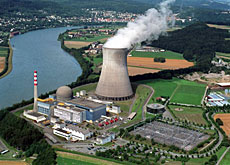
Nuclear debate reaches critical point

When the Swiss go to the polls on Sunday, they will once again be asked to vote on the future of the country's nuclear power programme.
They face two proposals – one to extend the ban on building new plants and another to close down the industry altogether.
Nuclear power currently provides around 40 per cent of Switzerland’s electricity production – the remaining 60 per cent comes from hydropower.
But Greenpeace, which is one of the environmental groups spearheading the campaign for closure, says the industry has exaggerated its importance in meeting Switzerland’s electricity needs.
“Switzerland is basically swimming in electricity,” Greepeace spokeswoman, Eva Geel, told swissinfo.
“We don’t need all the electricity that is being produced by nuclear power plants – about 25 per cent would be enough because the rest is being exported.”
“Efficient alternatives exist, and these should replace nuclear power,” she added.
Sustainable energy
Those alternatives include sustainable forms of energy such as wind and solar power.
The anti-nuclear proposal “Strom ohne Atom” calls for a complete closure of Switzerland’s five power stations by 2014.
It wants the shortfall to be made up by sustainable energy sources. But opponents insist that would be both unrealistic and costly.
“It’s an illusion from an economic, technical and ecological point of view to think that wind or solar power could replace nuclear,” power company spokesman Rolf Schmid told swissinfo.
“It wouldn’t be possible to transport enough of the wind energy being produced in northern Germany, for example, and even if it were, the costs would be prohibitive,” he added.
Schmid claims the only viable alternatives to maintaining Switzerland’s nuclear programme would be to import energy or build new plants driven by oil, gas or coal – a move, he says, that would not be allowed if the proposal were passed.
Rocketing costs
Pro-nuclear supporters also claim that switching to sustainable energy under the terms of the proposal could cost as much as SFr60 billion ($45.5 billion).
They claim that even the “gentler” approach of the second proposal – on extending the ban on building nuclear plants for another ten years – would cost the economy around SFr13 billion and lead to thousands of job losses.
Existing plants would be closed down after they had been in operation for 40 years, and permission for them to operate beyond that time would have to be sought at a nationwide vote.
Geel disputes the figures quoted by the pro-nuclear lobby in the run-up to the vote, and insists switching to sustainable energy would actually create employment – albeit in new fields.
“The energy ministry has put the total costs of changing from nuclear to sustainable energy at between SFr13 and 28 billion,” she said.
“That’s spread over a 20-year period and equates to SFr3 per person per week, so we can pay it, no problem.”
Burning issue
Sunday’s ballot will not be the first time that the Swiss have been asked to vote on the future of the country’s nuclear industry.
Since 1979 there have been five different anti-nuclear proposals. Only one of them – in 1990, which called for a ten-year moratorium on the building of new plants – was successful.
Of Switzerland’s neighbours, Germany has already decided to close its 19 nuclear power stations – producing just over 30 per cent of the country’s electricity – by 2021.
France has no plans to close its network of 59 stations, producing 75 per cent of its electricity, and neither Italy nor Austria have any nuclear power plants.
swissinfo, Jonathan Summerton
Switzerland has five nuclear power stations – the oldest was built in 1969 and the most recent in 1984.
Around 40 per cent of Switzerland’s electricity is produced by nuclear power plants.
The government is recommending a “no” vote to both proposals.

In compliance with the JTI standards
More: SWI swissinfo.ch certified by the Journalism Trust Initiative

























You can find an overview of ongoing debates with our journalists here . Please join us!
If you want to start a conversation about a topic raised in this article or want to report factual errors, email us at english@swissinfo.ch.